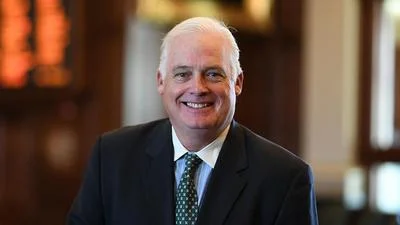While the vote on a proposed budget deal is still expected in the Illinois State Senate despite some recent hangups, Illinois' Republican Gov. Bruce Rauner can't agree to it, the co-founder of a political group said during a radio broadcast.
Senate President John Cullerton (D-Chicago) and Senate Republican Leader Christine Radogno (R-Lemont) proposed the brokered, bipartisan, multi-billion-dollar budget deal.

Illinois Opportunity Project Co-Founder Patrick Hughes
Cullerton had said to expect action on the far-reaching proposal when the senate returned in February but the plan was not brought up for a vote in its entirety after it was clear votes from the GOP would be hard to come by. A review by the governor's office found that the Illinois Senate plans to leave the state with a $4.3 billion deficit, significantly lower than it is now.
"My big point about this whole budget, whether Sen. Radogno is talking about it or seriously considering agreeing to this with Cullerton, is what's the governor is going to do," Patrick Hughes, cofounder of the Illinois Opportunity Project, said during a recent edition of "Illinois Rising." "And it strikes me that if this were somehow to pass the Illinois Senate ... In my view, the governor would have to veto it. Because if he doesn't, what he's telling the people who elected him, what he will be telling the people who will potentially re-elect him in 2018, is that 'All the things I said about standing with you and fighting with you' would all go away to cut a complicit deal."
The deal may seem to Rauner and other state lawmakers like a good one at the moment, but it will come back to bite the governor, according to Hughes.
"What then will ultimately happen, in my opinion, is he'll ride a little wave of bipartisan, feel-good moments, we've got a budget and all this stuff," Hughes said. "But when he goes down the road to campaign on what he's accomplished, the left is going to hammer him with his own bill that he agreed to and he signed -- that it wasn't enough, that he insisted on certain things, that this is the part of the bill that is killing us still -- instead of just sticking to his guns and staying on the side of the tax payer."
The state has been without a budget for nearly two years, a problem fought out largely between Rauner and long-time Illinois State House Speaker Michael Madigan (D-Chicago). However, observers have been saying the most recent budget compromise could end that stalemate between the Republican governor's office and the Democrat-controlled General Assembly.
The budget compromise would raise taxes and the minimum wage, include few reforms and require about $7 billion in additional borrowing by Illinois, a state more than $200 billion in debt. The income tax hike amounts to a 33 percent increase -- from 3.75 percent to the proposed 4.95 percent.
The budget proposal's 7 percent corporate income tax hike, up from the current 5.25 percent, would make Illinois the fourth-highest in the nation for corporate income tax rates.
Additionally, the proposal would introduce a new sugary drinks tax, a property tax freeze, term limits for legislative leaders and an expansion of gambling facilities.
The proposal would have the state spend almost $450 million over two years to bail out the Chicago Teachers’ Pension Fund, topping a previous $215 million bailout proposal Rauner vetoed Dec. 1 in a closed-door negotiation breakdown that Rauner blamed on Cullerton.
Problems over the pension fund led to a Standard & Poor's downgrade of Chicago Public Schools in the latter part of last year.
The proposal does include some modest reforms, including fixes to the state workers’ compensation program and pension system, but it isn’t enough to appease the state’s conservatives, Hughes said.
"(Rauner) can truly be an independent voice to say, 'Hey, look, this state is a mess, it's been run into the ground, Mike Madigan and all of his cronies have destroyed peoples' lives, have hurt peoples' lives; and I'm going to be the person who will be the bulwark against that,'" Hughes said. "That, to me, standing on the side of the taxpayer, of the citizen, is his best chance at reforming the state and being re-elected in 2018. If he agrees to something like this, he gives a lot of that up."






 Alerts Sign-up
Alerts Sign-up